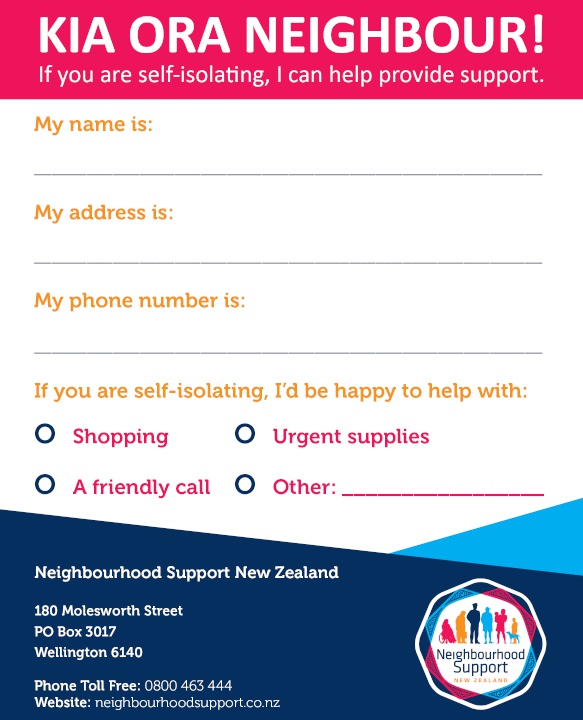Neighbourhoods Encouraged To Work Together In Their Preparation For Omicron
With the possibility of many people self-isolating over the coming months, Neighbourhood Support New Zealand want to highlight a few key things that we can all do during this time to make sure we are best prepared at home and in our neighbourhoods.
Chief Executive, Tess Casey, explains that “there's every chance that over the next while people could find that their usual support networks, such as family and friends, may not be available to help in the case of required self-isolation.” She suggests that this is where a neighbourhood support group will come in very handy and implores communities to think about establishing one for their neighbourhood if they have not done so already.
A neighbourhood support group can help people establish networks within their communities so that they are never short on someone to help them with errands outside the home, such as picking up groceries or walking the dog. Neighbourhood Support have collated an extensive range of resources to help communities and individuals in their preparations and planning.
“We have many resources available to our member communities, such as our ‘Neighbourhood Plan’ document and our ‘Kia Ora Neighbour’ flyer – a simple flyer that is able to be printed off, filled in, and popped into you neighbours' letterboxes as a friendly reminder that you are available to help as needed.”

In addition to neighbourhood planning, the not-for-profit organisation have also asked everyone to be mindful of whether they have a sufficient emergency kit in their home. “It's never a bad thing to have on hand and now is a good time to get yours updated,” said Casey, “and in the spirit of supporting your neighbours, perhaps there’s someone on your street who you could offer to help put one together for?” An Omicron-ready home emergency kit might include things such as repeats of any essential medications, pain relievers, a thermometer, easy meals, perhaps some additional vitamin C & D, and simple things like tissues and cleaning products.
And what should one do if they find themselves in self-isolation at home? Casey encourages, “There’s lots of great health advice out there but it’s also important to stay connected and reach out for help if you need it.”
We all know that social connection is a fundamental human need - perhaps now more than ever – and Neighbourhood Support are encouraging people to make sure they have someone who they can check in with each day. This can be taken a step further by thinking about those in your community and perhaps offering to be a ‘check in buddy’ for someone else in your neighbourhood.


 Gordon Campbell: On Marketing The Military Threat Posed By China
Gordon Campbell: On Marketing The Military Threat Posed By China Te Matapihi: Response To Govt’s New Strategic Housing Partnerships: Progress, But Equity Gaps Remain
Te Matapihi: Response To Govt’s New Strategic Housing Partnerships: Progress, But Equity Gaps Remain Banking Class Action: Government’s Retrospective Law Change Threatens Consumer Protections
Banking Class Action: Government’s Retrospective Law Change Threatens Consumer Protections E tū: Journalists Respond To Grenon - Still No Commitment To Editorial Independence
E tū: Journalists Respond To Grenon - Still No Commitment To Editorial Independence Marlborough District Council: Kevin Judd Named Marlborough’s Newest Living Cultural Treasure
Marlborough District Council: Kevin Judd Named Marlborough’s Newest Living Cultural Treasure Parliamentary Commissioner For The Environment: Are We Planting The Forests We Need?
Parliamentary Commissioner For The Environment: Are We Planting The Forests We Need? Te Uru Kahika: Environment Report Demonstrates Critical Role Of Regional Science In New Zealand’s Future
Te Uru Kahika: Environment Report Demonstrates Critical Role Of Regional Science In New Zealand’s Future


